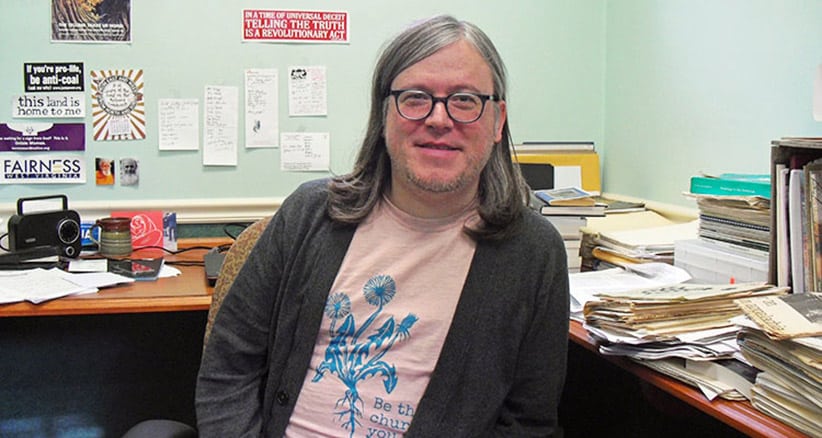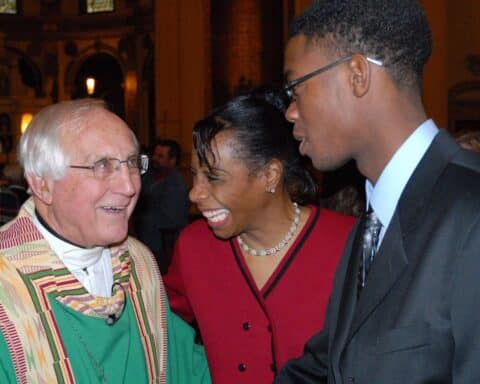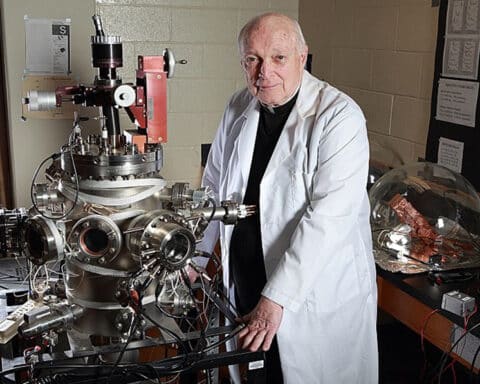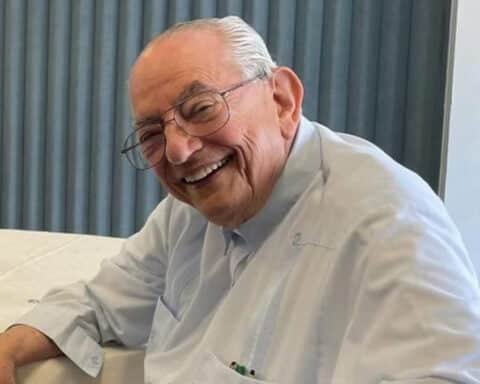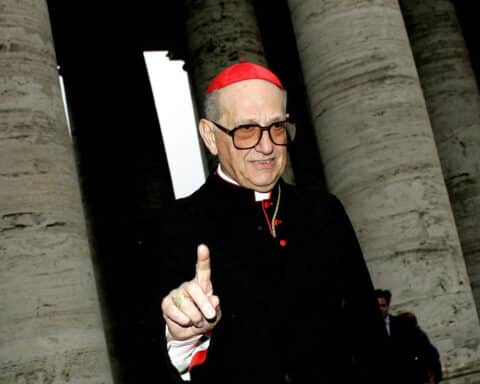The last thing Michael J. Iafrate said to his friend, Sarah George, was that he looked forward to getting in “good trouble” again soon with her and the rest of the team at the Catholic Committee of Appalachia.
“I thought those were really beautiful last words for him to share. It was really lovely, and very true to who he was,” George said of her colleague at the Catholic Committee of Appalachia, a grassroots network of activists inspired by a Catholic vision of social justice.
Iafrate, a West Virginia-born theologian, musician and activist who wrote of a “magisterium of the poor” and spoke out against corruption in the hierarchy, died May 12 from complications related to treatment he underwent after a bone marrow transplant a few weeks ago. He was 44.
“We’re all emotionally reeling from the shock of this, trying to be there for each other and band together as a group,” said George, who last communicated with Iafrate on Facebook Messenger a couple of weeks ago. She revisited those messages after learning of Iafrate’s death.
“It’s overwhelming to get on Facebook and see all these testimonials about his effect on people,” George told Our Sunday Visitor. “He was such a huge presence, so I can’t say I’m surprised that he touched so many lives, and in so many ways, through his work for justice in Appalachia.”
Iafrate, who had been involved in social justice activism for the better part of the last two decades, joined the Catholic Committee of Appalachia’s board of directors in 2013. A couple of years later, he served as the lead author of “The Telling Takes Us Home: Taking Our Place in the Stories that Shape Us,” a document referred to as the “people’s pastoral.”
In the document, Iafrate reflected on the dreams, desires and disappointments of Appalachians. Iafrate told Catholic News Service in 2015 that he and the CCA team pressed on with “the people’s pastoral,” with or without any bishops’ signatures.
“It’s that the authority is coming from elsewhere, that all the people of God need to listen to the voices of people, whether laypeople or clergy or bishops. That’s another kind of authority that we all need to attend to,” Iafrate said.
Those who knew him testified to Iafrate’s deep Catholic faith and his love for Appalachia and its people. Bishop John Stowe of Lexington, Kentucky, who serves as the episcopal adviser to the Catholic Committee of Appalachia, said Iafrate’s was “a prophetic voice in the Church.”
“He had a sharp mind, formed by his theology which fully embraced the preferential love for the poor,” said Bishop Stowe, who told Our Sunday Visitor in an email that Iafrate’s passion for Appalachian people, culture and faith expressions were merged with a theological vision to his work.
“Michael’s voice could be critical of the institutional Church when necessary, but it was done from a deep desire to see the Church be all that it should be in proclaiming the reign of God,” Bishop Stowe wrote.
Iafrate helped to sound the alarm against Bishop Michael Bransfield, the disgraced former head of the Diocese of Wheeling-Charleston, West Virginia. In September 2018, Bishop Bransfield resigned amid scandal for spending millions of dollars in diocesan funds on himself and over allegations of decades-long predatory behavior.
“Any secular organization with a leader who was found guilty of the kinds of abuse that Bransfield has committed would not hesitate to cut all ties with that individual,” Iafrate told Our Sunday Visitor in September 2020.
Bishop Stowe said he “was always learning something” from the questions Iafrate asked him.
“The capacity to listen deeply and to speak boldly, just as Pope Francis directed bishops to do in the synods, made Michael an effective advocate,” Bishop Stowe said.
George added that Iafrate would spend hours on the phone with clergy sexual abuse survivors, just listening to their stories.
“He was very connected to that kind of whole movement for justice and for bringing the truth to light,” she said. “I even heard him say during board meetings that this is part of our call as Catholics, especially post-Vatican II, to be an active presence in our faith communities and to call out injustice, even when that injustice comes from our leadership within the Church. He was certainly not afraid to be that prophetic voice.”
Ed Sloane, the board chairman for the Catholic Committee of Appalachia, told Our Sunday Visitor that he never met anyone like Iafrate, “who lived his faith more deeply and without apology, with a level of conviction beyond that of anyone I’ve ever met.”
“So much of that commitment, that level of faith, was inspired by Appalachia, by the land and the people of Appalachia, and a deep love for the Catholic Committee of Appalachia and its mission,” said Sloane, who met Iafrate more than 20 years ago when both were involved in the underground punk music scene in Wheeling, West Virginia.
“Michael believed deeply that theology is a universal vocation,” Sloane said. “He was deeply committed to the theological voice and authority of the people and of the earth itself.”
Iafrate was a doctoral candidate in theology at the University of St. Michael’s College in Toronto, where he was working on a dissertation entitled “Decolonizing Appalachian Theology.” He was published in various Catholic, religious and secular publications, and contributed to several published books.
Shortly after he and his wife welcomed their third daughter last August, Iafrate had started experiencing debilitating pain that he and others first attributed to his psoriatic arthritis. In October, as his pain progressed, Iafrate was diagnosed with Chronic Myelomonocytic Leukemia-2, a rare type of blood cancer.
George said she had been in touch with Iafrate during his cancer treatment, adding that it had been going rather well despite some ups and downs. She said the news of his death came as a shock since he had “been successfully battling his illness over the past six or seven months.”
“And of course, there is a deep sense of sadness and loss. He was such a huge presence, certainly gone too soon,” George said, adding that the Catholic Committee of Appalachia will be looking to honor Iafrate’s legacy soon with a long statement online. A GoFundMe campaign to help Iafrate’s family has garnered more than $70,000.
“There have been a lot of people communicating with us about their desire to continue to keep Michael’s voice alive and honor him and his work by continuing his work,” George said.
Sloane said the best way to honor Iafrate’s legacy is to advance the Catholic Committee of Appalachia’s mission of being a grassroots voice for the region’s people because that is what Iafrate most believed in.
“We owe it not only to Michael’s legacy,” Sloane said, “but to Appalachia.”
Brian Fraga is a contributing editor for Our Sunday Visitor.

